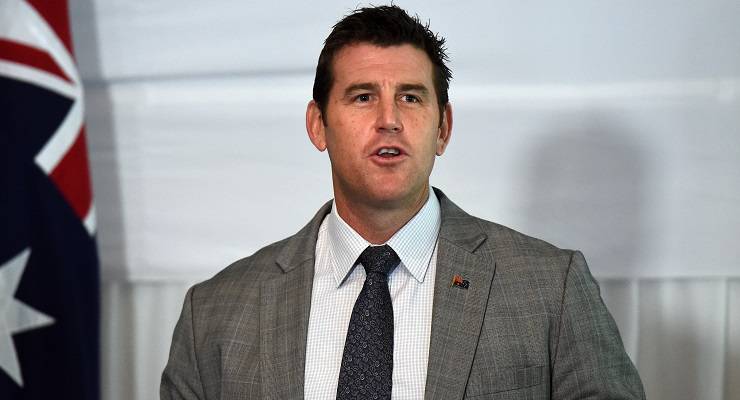
As recently as last week, Ben Roberts-Smith has been lauded as a military icon. He was awarded Australia’s highest military honour — the Victoria Cross — for bravery, after darting through gunfire to save his troop in Afghanistan. News Corp’s The Daily Telegraph described him as the country’s “most decorated veteran“, while readers of Seven West’s The West Australian will know him as a “hero“.
But if you’ve been following Nine’s investigations, it’s more complicated, with a long list of allegations investigated and published about Roberts-Smith’s time in the defence force (allegations Crikey is not publishing for legal reasons).
The West Australian and News Corp’s reactions have been to rally behind Roberts-Smith, publishing article after article in defence of the soldier, now a Seven West employee. Nine’s response has been to continue its investigations and allegations, despite defamation proceeding lodged by Roberts-Smith.
The West’s tactics
The West Australian has published more than 100 articles mentioning Roberts-Smith’s name. The first dozen, published in 2011 when the soldier received the Victoria Cross, were glowing (although, so was the coverage in every other outlet).
From 2016, when Seven West appointed Roberts-Smith as general manager of Channel 7 Brisbane and Seven Queensland, coverage became almost gushing. “Try to imagine for a moment being Ben Roberts-Smith. You’re the embodiment of masculinity — bigger, stronger and taller than almost every other bloke,” one journalist wrote in a feature article published by the West and News Corp-owned The Courier-Mail.
That same year, allegations were published in a book by veteran investigative journalist Chris Masters, which were followed by Fairfax (now owned by Nine) investigations into Australia’s elite forces in Afghanistan — something the Inspector-General of the Australian Defence Force is also investigating.
In response, The West Australian (as well as News Corp’s The Australian) began shifting the narrative to the defence of Roberts-Smith. Headlines ranged from “Inquiry risks making SAS feel betrayed”, to “War hero ‘will be cleared’”, to simply, “Leave Ben alone”.
A former journalist for the West told Crikey the paper’s approach was heavy-handed. “The sheer level of pushback that the West did really early on was really extraordinary,” they said. “Most of the people knew what the view would be … a lot didn’t want anything to do with it. Kerry Stokes was feral in defence of Roberts-Smith.”
But it’s no surprise the rhetoric took this turn — Seven West media boss Stokes is deeply interested in the Australian military. He’s bought medal sets of war heroes and is the chairman of the Australian War Memorial Council. Stokes works alongside former defense minister Brendan Nelson at the War Memorial, while former West editor Bob Cronin is on the board of Bravery Trust, a charity for veterans.
The West Australian did not respond to Crikey’s request for comment.
Fairfax, News Corp and ABC’s approach
Fairfax/Nine has published over 90 articles on Roberts-Smith: the first two dozen cover his medals, career and media mentions. In 2017, the tone changed, with every article touching on old or new allegations.
The ABC has largely refrained from covering allegations made in the Fairfax and Nine reports against Roberts-Smith, instead covering his response to the “malicious” reports and “gossip”.
News Corp has erred on the soldier’s side, calling the ordeal a “trial by media unfair to hero” and asking “what happened to innocent until proven guilty?” They covered later allegations against him, but noted the story would “tarnish the applauded veteran’s much-respected image”.
So what’s fair?
Concerns were raised — including by Roberts-Smith in a statement — that the ADF inquiry could be influenced by the media coverage. Australian Defence Association director Neil James believes the trial by media is unfair.
“It’s a complex and lengthy inquiry. I think there’s been insufficient thought given to the fairness in much of the reporting,” James said.
One issue, James said, is that the complexities of the special forces aren’t understood.
“Very few journalists follow defence issues on a day to day basis,” he said. “Generalist journalists tend to miss the full context.”
He added the media needed to examine the range of causes behind problems — especially the over-tasking of Special Forces in Afghanistan — instead of focusing on high-profile individuals. “Let the inquiry run its course rather than sensationally and unfairly speculate,” he said.
Executive editor of The Sydney Morning Herald and The Age James Chessell told Crikey that because the matter is before an independent body — not a jury — the inquiry wouldn’t be influenced: “As the media campaigns for the public’s right to know, it is strange to suggest that journalists should not conduct forensic investigative reporting into matters of public interest because formal inquiries are also underway.”








Crikey encourages robust conversations on our website. However, we’re a small team, so sometimes we have to reluctantly turn comments off due to legal risk. Thanks for your understanding and in the meantime, have a read of our moderation guidelines.